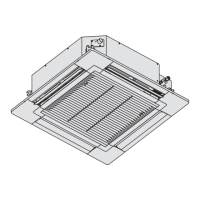4
When Transporting
• It may need two or more people to carry out the installation work.
• Be careful when picking up and moving the indoor and outdoor units. Get a partner to
help, and bend your knees when lifting to reduce strain on your back. Sharp edges or
thin aluminum fins on the air conditioner can cut your fingers.
When Installing…
• Select an installation location which is rigid and strong enough to support or hold the
unit, and select a location for easy maintenance.
• Make sure to install protective guards on the suction and discharge side to prevent
somebody from touching the fan motor, fan blades or heat exchanger.
…In a Room
Properly insulate any tubing run inside a room to prevent “sweating” that can cause
dripping and water damage to walls and floors.
CAUTION
Keep the fire alarm and the air outlet at least 1.5 m away from the unit.
…In Moist or Uneven Locations
Use a raised concrete pad or concrete blocks to provide a solid, level foundation for the
outdoor unit. This prevents water damage and abnormal vibration.
…In an Area with High Winds
Securely anchor the outdoor unit down with bolts and a metal frame. Provide a suitable
air baffle.
…In a Snowy Area (for Heat Pump-type Systems)
Install the outdoor unit on a raised platform that is higher than drifting snow. Provide
snow vents.
…At Least 1.8 m (Horizontal Installation)
Installation height for indoor unit shall be at least 1.8 m in the case of horizontal
installation.
However, choose the lowest among the following locations.
• Air inlet side of indoor unit
• Air outlet side of indoor unit
• Air inlet port in the room
• Air outlet port in the room
…In Laundry Rooms
Do not install in laundry rooms. Indoor unit is not drip proof.
01_350221_Eng.indb 4 2023/3/17 10:00:56

